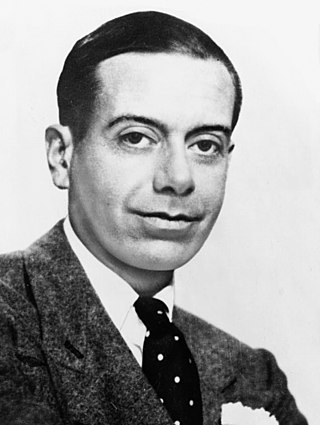
Cole Albert Porter was an American composer and songwriter. Many of his songs became standards noted for their witty, urbane lyrics, and many of his scores found success on Broadway and in film.

Ethel Merman was an American actress and singer. Known for her distinctive, powerful voice, and her leading roles in musical theater, she has been called "the undisputed First Lady of the musical comedy stage." She performed on Broadway in Anything Goes, Annie Get Your Gun, Gypsy, and Hello, Dolly!

Elizabeth Ruth Grable was an American actress, pin-up girl, dancer, model and singer.

Annie Get Your Gun is a musical with lyrics and music by Irving Berlin and a book by Dorothy Fields and her brother Herbert Fields. The story is a fictionalized version of the life of Annie Oakley (1860–1926), a sharpshooter who starred in Buffalo Bill's Wild West, and her romance with sharpshooter Frank E. Butler (1847–1926).

Anything Goes is a musical with music and lyrics by Cole Porter. The original book was a collaborative effort by Guy Bolton and P. G. Wodehouse, revised considerably by the team of Howard Lindsay and Russel Crouse. The story concerns madcap antics aboard an ocean liner bound from New York to London. Billy Crocker is a stowaway in love with heiress Hope Harcourt, who is engaged to Lord Evelyn Oakleigh. Nightclub singer Reno Sweeney and Public Enemy Number 13, "Moonface" Martin, aid Billy in his quest to win Hope. Songs introduced that later became pop and jazz standards are "Anything Goes", "You're the Top", "All Through the Night", and "I Get a Kick Out of You".
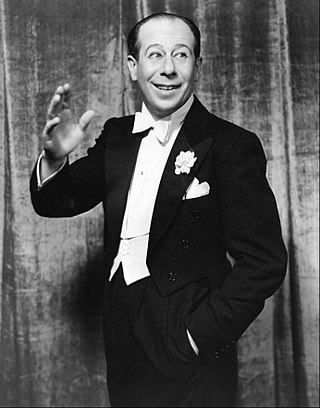
Irving Lahrheim, known professionally as Bert Lahr, was an American stage and screen actor and comedian. He was best known for his role as the Cowardly Lion, as well as his counterpart Kansas farmworker "Zeke", in the Metro-Goldwyn-Mayer adaptation of The Wizard of Oz (1939). He was well known for his quick-witted humor and his work in burlesque and vaudeville and on Broadway.
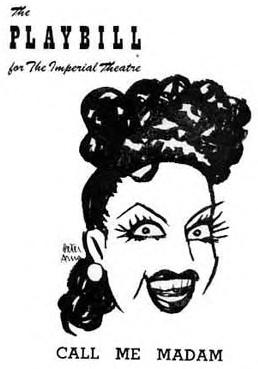
Call Me Madam is a Broadway musical written by Howard Lindsay and Russel Crouse, with music and lyrics by Irving Berlin.

Panama Hattie is a 1940 American musical with music and lyrics by Cole Porter and book by Herbert Fields and B. G. DeSylva. The musical is about a nightclub owner, Hattie Maloney, who lives in the Panama Canal Zone and ends up dealing with both romantic and military intrigue. The title is a play on words, referring to the popular Panama hat.

Gay Divorce is a musical with music and lyrics by Cole Porter and book by Dwight Taylor, adapted by Kenneth Webb and Samuel Hoffenstein. It was Fred Astaire's last Broadway show and featured the hit song "Night and Day" in which Astaire danced with co-star Claire Luce.

Ford Star Jubilee is an American anthology series that originally aired monthly on Saturday nights on CBS at 9:30 P.M., E.S.T. from September 24, 1955, to November 3, 1956,. The series was approximately 90 minutes long, broadcast in black-and-white and color, and was typically telecast live. Ford Star Jubilee was sponsored by the Ford Motor Company.
Something for the Boys is a musical with music and lyrics by Cole Porter and a book by Herbert Fields and Dorothy Fields. Produced by Mike Todd, the show opened on Broadway in 1943 and starred Ethel Merman in her fifth Cole Porter musical.
"Well, Did You Evah!" is a song written by Cole Porter for his 1939 musical DuBarry Was a Lady, where it was introduced by Betty Grable and Charles Walters. It is written as a duet, with the pair exchanging bad news and each shrugging off the other's tidbits in favor of an aloof good time.
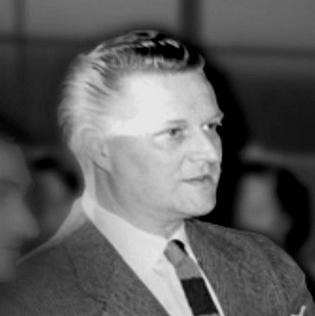
Robert Alton was an American dancer and choreographer, a major figure in dance choreography of Broadway and Hollywood musicals from the 1930s through to the early 1950s. He is principally remembered today as the discoverer of Gene Kelly, for his collaborations with Fred Astaire, and for choreographic sequences he designed for Hollywood musicals such as The Harvey Girls (1946), Till the Clouds Roll By (1946), Show Boat (1951), and White Christmas (1954).

Let's Face It! is a musical with music and lyrics by Cole Porter. The book by Herbert and Dorothy Fields is based on the 1925 play The Cradle Snatchers by Russell Medcraft and Norma Mitchell.

Hold Everything! is a musical comedy with lyrics by Lew Brown and B. G. de Sylva, music by Ray Henderson, and has an accompanying book by John McGowan and B. G. de Sylva. A musical about professional boxing, the work's central character is welterweight Sonny Jim Brooks. The musical takes place at "Pop" O'Keefe's Training Camp on Long Island; at the Hotel Wood; and at Madison Square Garden, New York.

Du Barry Was a Lady is a 1943 American musical comedy film directed by Roy Del Ruth, starring Red Skelton, Lucille Ball, Gene Kelly, and Tommy Dorsey and His Orchestra. It is based on the 1939 stage musical of the same name. Shot in Technicolor, the film was produced and distributed by Metro-Goldwyn-Mayer.
Lost Musicals is a British musical theatre project established in 1989 by Ian Marshall Fisher. It is dedicated to presenting lost or forgotten musicals by famous American writers, and has been responsible for the first revivals of the lesser-known works of writers such as Stephen Sondheim, Cole Porter, Alan Jay Lerner, Richard Rodgers, Oscar Hammerstein II, Harold Arlen and Jerome Kern.
Harold J. Cromer was a vaudevillian, Master of Ceremony, Hoofer, Choreographer, and Comedian. He was known as Stumpy in the dance/comedy/acting duo Stump and Stumpy.
Ronald Graham was a Scottish born actor and singer who had a career performing in American radio, film, and theater from the early 1930s until his death in 1950. After winning a national singing competition, he became a regular performer on the radio program Blue Monday Jamboree from 1931 to 1935. He is best remembered for his many appearances in Broadway musicals from 1937 to 1944; notably creating roles in the original productions of works by Richard Rodgers, Lorenz Hart, Cole Porter, and Arthur Schwartz.
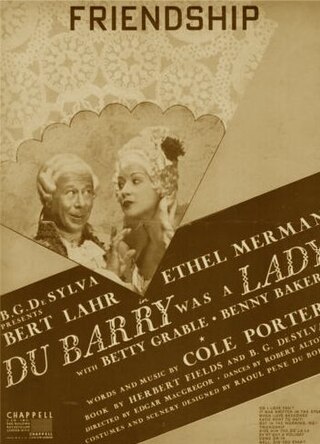
"Friendship" is a song written by Cole Porter from his 1939 musical DuBarry Was a Lady where it was introduced by Ethel Merman and Bert Lahr. The song was once again performed in the 1943 film version starring Red Skelton, Lucille Ball, Gene Kelly and Tommy Dorsey.















